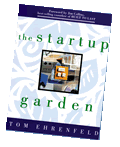
Itís Personal, and Itís BusinessÖ In the otherwise forgettable movie Youíve Got Mail, Meg Ryanís character delivers a great comeback to Tom Hankís character when he cites the Godfather credo that ďitís not personal, itís business.Ē She replies:
I believe that all great entrepreneurial books must address this unique dynamic, that of the tension between personal and impersonal. Because so many startup founders must learn both content and process at a dizzying pace, the most useful books blend insights into the practical needs of startup ventures while simultaneously revealing how different individuals learn how to learn this material. Business, in other words, IS personal at this level, no matter how hard you want to believe the credo of the Godfather. Eventually, and the sooner the better, startups must operate on explicit and fair principlesóbut this ideal state is invariably postponed by the people who make the business. And so the most instructive books are those which show how the entrepreneur learned what they know. Indeed, one of my favorite entrepreneurial tales ever told treads this very line with poise. Jerry Kaplanís Startup: A Silicon Valley Adventure might be the best and most engaging tale of one entrepreneurís painful education. Yet Iím delighted to note that not one, but two new books can be added to the canon of great startup stories. Today Iíd like to tout Mommy Millionaire: How I Turned My Kitchen Table Idea Into a Million Dollars and How You Can Too! by Kim Lavine. I have to start by revealing a personal bias about entrepreneurial books that take on issues of gender. I hate most of them, and not because the topic isnít important to meóin fact quite the opposite. My critique is that most efforts to identify key differences between male and female entrepreneurs are simplistic or wrong or tainted by entitlement. They just donít approach the topic proportionately, and I just canít stomach them. (One rare exception: Clearing the Hurdles, which I touted on this site previously.) Iíve always preferred smart stories written by women who, by dint of honesty, insight, and experience, shed more insight into the topic simply by sharing what they experienced and learned. (For example: the fantastic memoir Naked in the Boardroom by Robin Wolaner) Enter Mommy Millionaire, a memoir-cum-fieldbook by a mother who launched a successful company that sells comfort tchotchkes. (No disrespect intended by the way.) Her book rocks, and I highly recommend it as a terrific resource for anyone in the early stages of a startup. She is a terrific writer, and her book is rich with smart insights and useful how-to material. Better, she has an excellent story to tell. Several years ago she decided to make Christmas presents for her sonís teachers, and invented a corn-filled pillow that could be easily heated and used to comfort oneís neck. She gave it a bit of fun design, a cute name (Wuvits), and fed what she discovered to be a real demand for the product. All startups are sagas, and I wonít recap her long tale (again, do get the book), but will note that her candor and humility are noteworthy. She learns over and over from mistakes and foibles, which is not to say that sheís naÔve or ineptóitís just that she has the fortitude to face up to her mistakes and above all, like a shrewd entrepreneur, to learn from them. Tapping into the theme of this post, hereís a nice quote from her eminently practical book:
Read her book to share her voyage along that path, and pick up some pointers on the way. You can learn more from her website as well. Later this week Iíll rave about another terrific business taleónot a startup story, but one that also delves into the business-human issue, and which shares powerful insights about the human challenges of good business. Posted by tom at March 5, 2007 06:07 PMComments
Very insightful. I'm in that boat of new business owners who are rowing like crazy against the currents. Knowledge is truly one of the biggest boulders we will have to row by in this cut-throat stream of business waters. I think that the business world has failed to teach us HOW TO LEARN. It is instead flooding the waters with rocks that show what/how others are doing business and not why they are doing it. We feel disempowered because we cannot access the tools for rowing past the boulders that are threatening to damage our rafts. While we struggle like this, the powerful boats and cruisers of big established firms blow by past us and splash waves at us. Hm... Posted by: Herman Najoli on March 18, 2007 08:17 PMPost a comment
|
Recent Writing Flow as the Grand Unifying Theory of Productivity Lowering the Personal Entrepreneurial Threshold Good Writing Begets Good Writing
THE BOOK
Read or print the Intro and
Read some book reviews at Inc, 1-800-CEO-READ, and the Miami Herald. Read the publisher's press release. Visit the companies that Tom discusses in the book Hear a recent lecture by Tom on the Startup Garden STARTUP RESOURCES Read about other books and web sites about starting your own business. TOM'S WRITING Just Managing – articles that Tom wrote for The Industry Standard and some Business Articles written for Inc., Fortune Small Business, Harvard Management Update, and other places. BUY THE BOOK To buy directly from me, simply go to Paypal and send 15 bucks to Tom@startupgarden.com. I'll take care of the rest. If you have any questions, email me at that address. |
| © 2001-2003 Tom Ehrenfeld | Site design by Tim Swan | |
